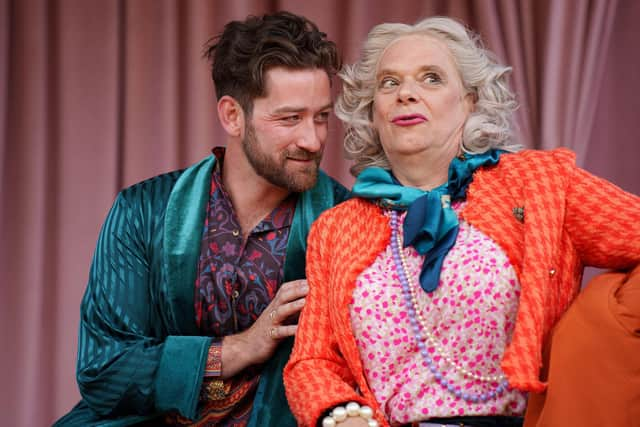Theatre reviews: The Importance of Being Earnest | Jekyll and Hyde
The Importance of Being Earnest, Botanic Garden, Glasgow ****
Jekyll and Hyde, Botanic Garden, Glasgow ****
That Oscar Wilde was an exceptional man goes without saying; and that he was destroyed for his sexuality by the same human society he so merrily mocked, is a matter of record.
Advertisement
Hide Ad

Yet in his prime – when he created his great 1895 comedy The Importance Of Being Earnest– he quipped and satirised with a such a magnificent and perfectly-structured glee that that society itself could not help laughing along with him; and now here, 128 years on, in a very different city, is an audience of hundreds, perched on a grassy slope in uncertain Glasgow weather, roaring with laughter at those same glittering jokes, and the instantly recognisable idiocies they send up.
The success of the show, of course, depends entirely on the Bard In The Botanics artistic director Gordon Barr, and his impressive 2023 ensemble.
So here, in the opening scene, we have Stephen Arden and James Boal as Jack Worthing and Algie Moncrieff, downing cucumber sandwiches in Algie’s rooms in Half Moon Street, but clad in vaguely modern dress, and deploying their own modern-day accents – Scottish and Northern Irish – with exactly the same operatic confidence normally associated with Jack and Algie’s posh Edwardian idiom.
To say that this works well understates the case. It simultaneously respects the basic plot of the play – which certainly depends on Edwardian upper-class London mores – and delivers it intact into the 21st century, where the audience have no trouble in recognising not only stalwart Jack and mischievous Algie, but also the whirlwind of energy that is Jack’s love Gwendolen – a tradition-busting, speed-vaping posh girl for the ages, superbly played by Claire Macallister – and her battle-axe mother Lady Bracknell.
Add another two fine performances – once the action decamps to the country – from a quiet-voiced but razor-sharp Glaswegian Elmi Quinn as Jack’s lovely ward Cecily, and a magnificent and pitch-perfect Lynsey-Anne Moffat as the governess Miss Prism, and you have a team so much in love with the killing wit of Wilde’s comedy that two-and-three-quarter hours of playing time whip by in a flash, with never a dull moment.
That the play takes a dim view of Britain’s oddly resilient ruling class, and its signature habit of following the money wherever it leads, goes without saying. Yet the style in which the Irishman Wilde delivers that radical message is so magnificent that it brooks no argument; and 21st-century Glasgow is clearly up for that, both in this joyful production, and in the audience’s response to it.
Advertisement
Hide AdRobert Louis Stevenson’s great story of Dr Jekyll And Mr Hyde, published just a decade before Wilde’s play, also offers a stern critique of respectable Victorian society; although in a more serious tone, that combines gothic horror with agonised moral questioning. Most of the questioning, in Stevenson’s story, comes through the character of Jekyll’s lawyer friend Gabriel Utterson, and it’s this strand that Jennifer Dick chooses to foreground in her intense 90-minute version of the story for three actors, now playing in the Kibble Palace.
The narrative is therefore presented entirely by an impressive Stephanie McGregor as a be-suited female Utterson, absorbing herself seamlessly into the masculine world of Stevenson’s drama.
Advertisement
Hide AdWith Adam Donaldson and Sam Stopford gradually and horrifyingly emerging as one person, in the roles of respectable Jekyll and brutish Hyde, the show reaches a demanding but thrilling emotional and intellectual conclusion, as Utterson stands by her complex, liberal and positive view of human nature, in the face of Jekyll’s drift towards the idea that his “real” nature is savage and brutal, while civilisation and decency are only a veneer. And as we observe the condition of a world now deeply endangered by a 45-year political flirtation with a similar negative idea of humanity and its motives, it’s hard to avoid the conclusion that Stevenson’s great and much-adapted story was both deeply prescient, and unfailingly wise.
Both shows at the Botanic Gardens, Glasgow, until 29 July